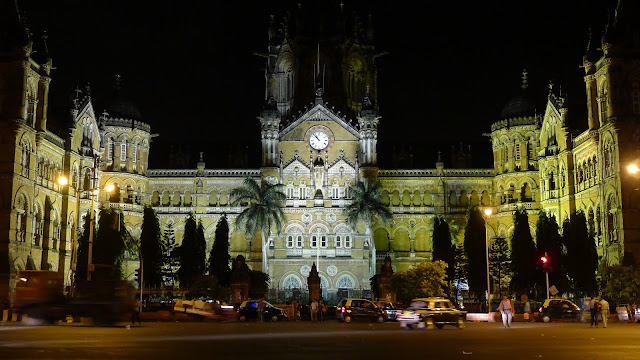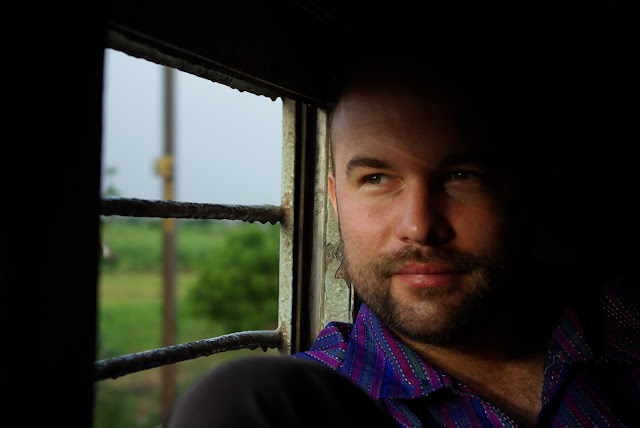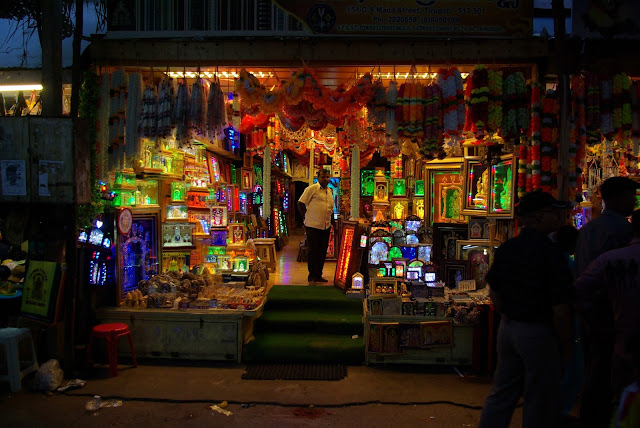I have been traveling regularly to India, for the last 7 or 8 years, so I have by now certainly spent more than half a year in the country. Recently it occurred to me that I am actually very grateful that I had the possibility to come here so often - and that I have learned quite a lot from 'Mother India', probably much more than I expected beforehand.
So what has India taught me?
1. Go with the flow...
Obviously, India is a country where, to phrase it mildly, not everything happens 'on time', and where situations are often not quite comprehensible. This is not only true for the 'stupid tourist from the west', also for Indians themselves what happens around them is not a consequence of some planning from above, but things happen simply due to one reason: because they happen. There is nothing to understand, nothing to plan - you can only accept the situation as it is, deal with it, and make the best of it. I think, being the German I am (or at least once was), learning to deal with this type of situation was rather challenging for me - but it was very much worth it. I still remember the situation where things changed for me, about 3 years ago (who cares about the precise year anyway!).
I was taking a tour around Delhi-Agra-Jaipur around 2010 - organized by the IRCTC (the Indian Railway Operator), but, of course, the whole trip was taking place by car (a much recommended tour by the way). Rajasthan was certainly worth a visit - one memomorable moment in Jaipur was when my cab couldn't drive because an elephant was on the right lane, and a camel on the left one, so the street was blocked. But the moment which really made me 'understand India' actually happened in Agra (home to the Taj Mahal).
 |
| It's not this handle.. |
I was taking a three-wheeler, and asked the driver to bring me back to my hotel. If you have been to India you will have realized that auto-rickshaws are overall amazingly reliable, although they don't look like it - this one, however, wasn't. So it was a hot day (probably 35 degrees or so), I was in a place unknown to me, maybe an hour's walk from my hotel, but who knows into which direction, and my mode of transport broke down. The driver fiddled with various parts of his three-wheeler, but nothing happened. I still remember that I was first getting rather nervous - an unknown city! The car doesn't work! I will die of thirst, hunger, and my parents will never find out! Well, this is what I thought first... but after a few minutes I suddenly felt such inner calm which I haven't felt often before, and also rarely since. I have felt that 'I am safe', that one way or another, I will get back to my hotel just fine. And I also clearly remember gaving the thought in this situation that, finally, 'I have understood India'. In order to be able to deal with India I cannot have my German planning mentality - this breaks down rather sooner than later in this country. If you come to India you have to be able to let go, to accept the way things happen around you - India is stronger than your plans. But once you give in you will have an amazing time - not only because of the country around you, but also because you are able to let go inside.
 |
| hm, not this one either... |
I am very glad that, by now, I am able to pick how to approach situations much more freely - many situations, in particular in work life, still require planning, so this is probably still my regular mode. However, if things don't quite work out - the plane is delayed or cancelled, something else is delayed: No problem, sit down, watch the sunset, and get a cup of tea. Things will work out eventually, one way or the other, but it will be fine..
 |
| It might be this screw...? |
 |
| But it might also be just time to leave... |
2. Speak up for yourself
India is without doubt an intense country to visit - it's very much about 'people'. It's crowded everywhere, there is constant interaction with everyone around you, whether you smell your sweaty neighbour on the bus, you touch other people because the train is crammed (as I experienced first hand on the commuter railway in Mumbai this time!), or whether a 3 year old kid is pulling your elbow and is asking for money.
What I had to learn from all this is to mentally protect yourself - by accepting the situations as they were (see above), but also by acting in ways more appropriate to the situation than what I have learned 'at home' (in western countries). I think the problem is that in western countries you are often taught to 'act nice' - if there is someone who would like to talk to you then listen, if there is someone who needs your help then lend him or her a hand, if someone needs consolation then try to give it to him. However, this does not work in India, at least not 'in public' - you would spread yourself too thinly, and be worn out rather soon. However, I would assume that many visitors who come from 'the west' to India are in some sense too open and receptive for the many impulses one receives over here.
 |
| The cook of the roadside dhaba where I had lunch that day - probably also overall one of my favourite pictures from my trips to India |
So what specifically happened to me? I think the worst situation that happened to me was in 2008, when traveling back from India via Mumbai airport. Some 'nice colleagues' asked me at the bus, when arriving at the airport, whether they could carry my luggage. I declined, but after 5 steps they still demanded money for 'helping me'. They asked for 500 Rupees (a ridiculous amount, about the weekly wage of a farmer) but they could offer a rather generous 'rebate' as well. Given the dark corner we stood in, and the fact that guy in front of me was about 2 meters tall, I was then more or less pressured to give him 200 Rupees in the end for his amazingly helpful 'service'.
Not that the money hurt - well, it didn't. The problem was rather to be forced into doing something you actually don't want to do, and you don't really have a choice how to react. (Not that this is the worst thing people can push you to do - but I can now only imagine what it must be to be forced in other, much worse situations. It's about feeling helpless - this is much worse than what actually happened to me here.)
 |
| The roadside dhaba upon my arrival... |
However, on a subsequent trip - accidentally or maybe not so accidentally the same tour of Delhi, Agra and Jaipur described above - there was a situation where I finally managed to act quite differently. Driving down the highway between Agra and Jaipur, the driver showed me an 'original Indian restaurant' at lunchtime, charging hundres of Rupees for Paneer Palak and selling wooden elephants in the entrance hall. I decided... that this is not quite the place where I wanted to have lunch that day, so I just started walking down the highway (at about 35 degrees, in the sun around noon), for some reason quite optimistic that there will surely be further dining options located along the way. And indeed, after a few hundred meters one of the 'roadside dhabas' appeared - another restaurant, without electricity or any of that modern rubbish, but one that served food in a way I much preferred to the first one.
 |
| Time to take pictures with the kids |
Of course, the place was rather basic, but I basically didn't care - I was happy I found this place and enjoyed my meal, which was the meal I have really chosen to eat myself. The funny event happened when I was asked to pay and when I was given the bill - the owners tried to charge me twice the original price! So I asked for the menu - however, they were now able to produce a second menu with much higher prices, and by that stage they had probably thought they had defeated me... but not quite, you are not going to mess with Anoop anymore! I had (more or less accidentally, this is one of my habits) taken a picture of the first menu which I was now able to show the waiter, so I asked for a pen and started to slowly and happily correct the prices on the bill to the original ones. The owner was slightly embarrassed, his kids were rather amused, and in the end I left a large tip anyway. It wasn't about the money - it was about being able to play this game, and I was very happy to be able to do so, finally! It took me about 6 visits to India and maybe half a year in the country in total, but now I am able to get you good prices in Chandni Chowk as well (so if anyone needs a wedding dress, please just let me know!). Forget your western attitudes when coming to India - here things work differently, so learn to play the game - and be friendly and fair, but also firm in what you want (and what you don't want), otherwise this country will not work for you.
 |
| The original price list, used for correcting the bill I have received |
 |
And the paneer dish I had this day - quite a rich dish, with cashew nuts on top, though I have to admit I do not recall the name of the dish
|
3. It's all about the individuum - and as humans, deep down, we are all very much connected
It is rather easy to believe prejudices and blanket statements ('Iran is evil!', 'America is evil!', 'Germans are like that!', 'Indians are like that!'), especially if you don't have any evidence to the contrary (such as from first-hand experience). Given my extensive travels I however came to realize that general statements are best ignored - they are more often plain wrong than not. I think the main problem I have with many prejudices and 'simply truths' that they tend to be divisive - and that I feel that, quite to the contrary, being _inclusive_ is key to interacting with people, so this is where prejudices are seriously getting into the way.
Before I repeatedly visited India, I have to my great shame to admit that I also believed a rather long list of blanket statements about it - 'be careful with the food!' (I ate at McDonalds the first few days when I went there for the first time... I could have had nice Dosas instead!), Indians do this, Indians do that. However, since I have started teaching here I came to realize that there are multiple (many!) layers to every truth, and it's important not get stuck in the first layers already. One of the biggest contrasts I have found in India is that between the 'ruling class', and those who 'actually do the work' (even more so than in other countries, I would say). Quite often you hear about the former, but when you go to India you meet the latter. If you read about India in the news, it is about corruption, it is about people going to bed hungry, it is about population growth and about the occasional terror attack by the Naxalites or trouble in Kashmir.
If you visit India, what you see is people who are amazingly driven to change their lives, and that of the country, for the better - they are in many cases bright (such as the students I have the pleasure to teach over here), hard-working, and have a good heart. There are the layers you 'see' (or believe to see) from the outside - but when you come to the country you have such a different impression that I have nearly given up on making 'rules on how the world should be, according to my understanding', the reality will always teach you otherwise anyway. I had similar experiences also in the US (where many people judge the country by its leadership), and I am sure if I have the honour to visit Iran in the future then I will have a similar impression there. (A visit is actually not that unlikely, given I currently have 2 PhD students from Iran in my group and I am always happy to visit their home institutions as well.)

So the bottom line of this story is: The leadership in India may be what it is, and you may read in the newspaper about the country what you want to read (you probably find evidence for anything you like): The students and people I have met first-hand when coming to this country for several years are simply amazing. They want to progress themselves, and their country - and I hope 'the leadership' will follow them as well sooner rather than later. It is important to look behind the superficial associations and prejudices everyone of us has - and the most honest way to do that is, in my opinion, to travel a lot. And, to not just be a tourist, but to really interact with inhabitants of different countries in a day-to-day environment. It is sometimes not easy to identify your own prejudices - putting yourself repeatedly into a challenging environment (such as India) certainly helps you to 'wake up', and it forces you to reorganize your thinking, and your attitudes.

I realized that once I have let go of many of my prejudices I have started to feel 'at home anywhere on this planet'. This feeling is difficult to describe, but I think deep inside humans are similar (culture forms them differently), and whether you are sitting in a hut in Andhra Pradesh or in a skyscraper in New York City, deep down you are still part of the same planet. This feeling is a very soothing, a very calming experience.
I think I should dedicate the last picture to the many students I have had the pleasure of teaching at IBAB in Bangalore - it was a very good time with every single one of you, and I wish you all the best for your future!


















































